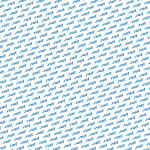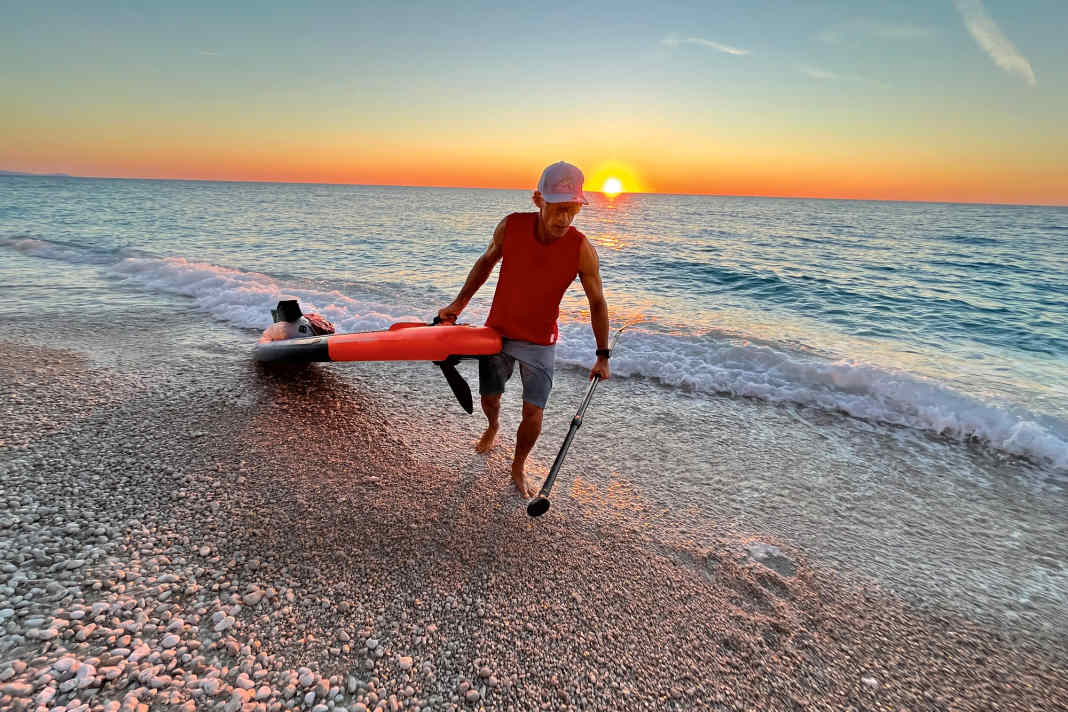





We're stuck in a quagmire. Nothing works any more. Even the flamingos look embarrassed. They are ashamed of the two beginners stuck in the silt of the lagoon. The birds don't even make an effort to fly away, even though they're standing in the water like pink mushrooms, close enough to touch.
Our idea seemed clever: a shortcut instead of a diversion - through the lagoon of Lefkada instead of travelling around it on the shipping lane. But the water depth shrank under our boards. First I stand in the centre of the 12'6, then at the front, and finally I do gymnastics on the nose so that the fin lifts. But at some point even that doesn't help. I'm stuck in the mud. My brother and paddling partner Laurin too. We look at each other and grin stupidly. Laurin gets off the board and sinks into the mud up to his belly button. It bubbles and stinks, gurgles and gurgles. We roll, push and labour towards the reed belt on the shore, our boards in tow. Fango massage for the advanced. But hey: the sun is shining, we've escaped the German grubby autumn, we've got a week of paddling fun ahead of us - so I'm happy to wallow in the mud that runs down my body in grey-blue streaks.
The Greek island of Lefkas seems ideal for our sunny escape: 35 kilometres long, 15 wide and dotted with pretty neighbouring islands. There is no mass tourism here like on Crete, but instead a wild west coast with lots of sandy beaches and a sheltered east coast with olive groves and sleepy fishing villages. And the climate! Summer from April to October, spring the rest of the year!
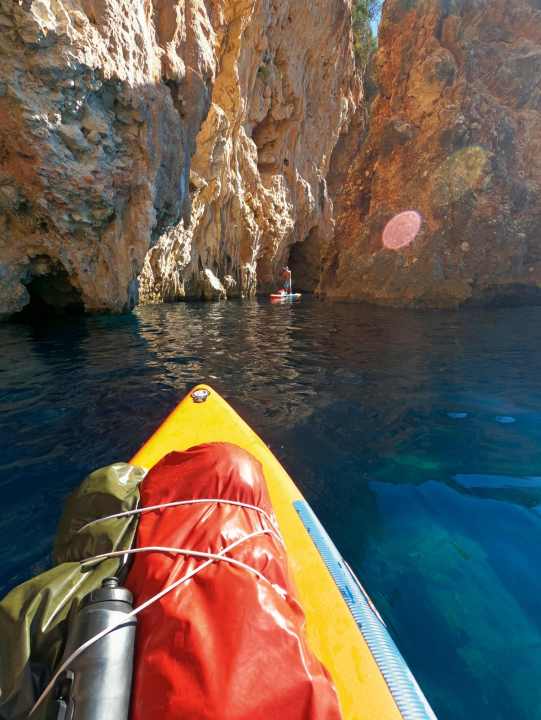
We don't know much more about our destination; nor do we want to! Our motto: discover for ourselves what is hidden behind the next headland. Without Wikipedia, Google Earth and 1000 images in our heads.
Mary, the angel of Lefkada
This also has disadvantages. For example, we don't know that Neanderthals were already roaming Lefkas 100,000 years ago (finds of stone blades prove it) and that the Byzantine fleet anchored in the harbour basin we just crossed 1000 years ago. Or that Homer even wrote his Odysseus to Lefkas 2700 years ago - the Greek hero found the gateway to the underworld at Cape Doukato. We want to reach the Cape of Hell in two days.
An angel of happiness is more important than travel guide knowledge. Ours is called Maria. A woman in her late forties with a curly head and sparkling eyes. My friend Gammo put me in touch with her and told me that we could safely leave our SUP panniers with Maria if we asked nicely. This is a critical aspect of every paddle tour: where do you leave the stuff you don't need on the tour? Because only the bare essentials go on the board: sleeping bag, diving goggles, penknife, head torch, for example, stowed away in waterproof bags. Maria runs the yacht charter IYC in the harbour of Lefkada and is so sweet that we want to hug her. She hands us a map, marks the must-sees with a few quick lines and even wants to take us to the best starting point by car. No, Maria, that's not necessary!
But necessary, as we now know. Covered in mud, we reach the strip of land that separates the lagoon from the sea, hump the boards, cross a sandy beach and set sail. Ahead of us lies the long west coast with cliffs of snow-white shell limestone. The wind hits us in the face when we look to the right. Good thing we have to turn left. Wind, wind, heavenly child. Ugly child! At least for all paddlers. Nothing can spoil the fun like wind. We met Andrea, a regatta sailor from Regensburg, at the baggage carousel at Preveza airport. She praised the "master wind", the Maestro. "It blows particularly strongly on Lefkas," said Andrea, clapping her hands. We bared our teeth. "Nah, we don't need the Maestro!" we said. She laughed. We didn't laugh.
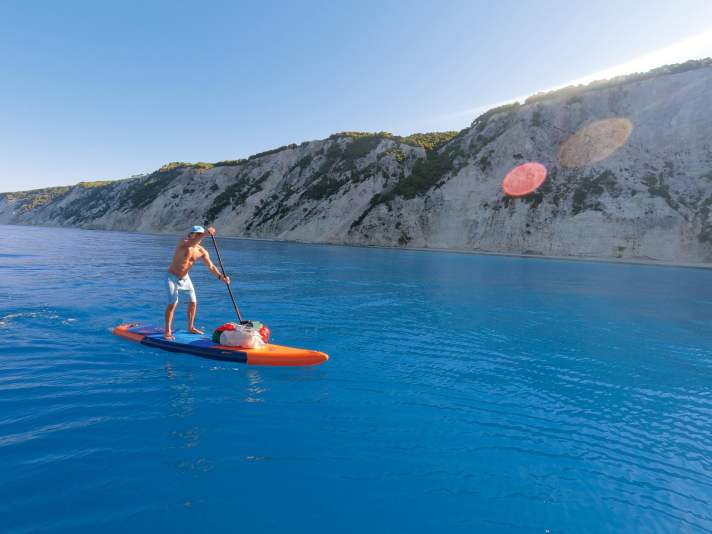
Wanted: The most beautiful place to sleep
But the Maestro is coming from the north, we want to go south. Lucky for us! We slide down the coast. Easy paddling, because the wind is pushing. At the end of Nikitas Bay, our stomachs growl and we point our noses towards a fishing village: white houses, a harbour wall, boats rocking in front of it. Jason Statham catches us. Bald head, square chin, hypertrophied neck muscles, sleeveless T-shirt - the waiter at the fish restaurant looks like the action hero from the UK. He spies us as we stand hungry in the harbour alley and wraps us around his finger. We willingly let him wrap us round his finger and enjoy his grilled sea bass and cold beer while the sun sinks into the sea.
On the first night, I'm still lax when it comes to choosing a place to sleep - we simply paddle to the nearest beach in the light of our headlamps and lie down on the gravel - but otherwise it's terribly important to me where we sleep. I want the most beautiful spot! Deserted, with a good vibe and enough driftwood for a campfire. On the second night, we find the number one place to sleep among all the others on Egremni Beach. Only a few winding roads criss-cross the hinterland here, and in very few places there are steps leading down the cliffs to the sea. We feel like Tom Hanks in "Cast Away": nobody here! Just us, the beach and the blue sea. We have everything we need with us and we don't need much: olives, cheese, apple slices, a bottle of red wine and a fire. That's enough to make us happy.
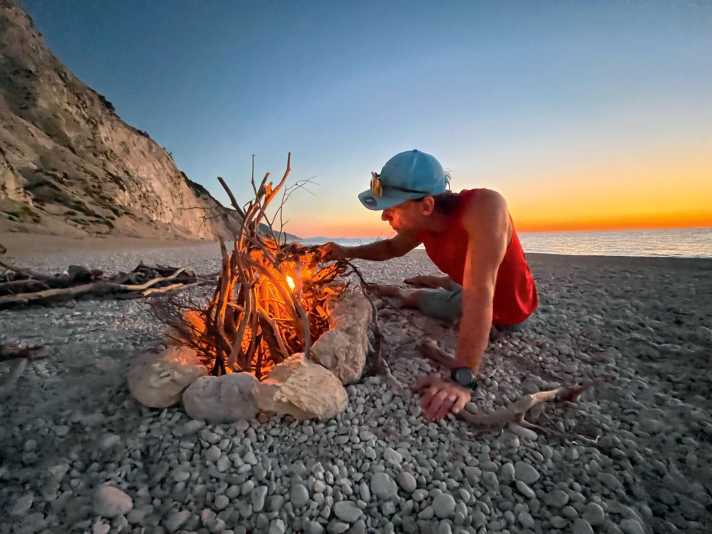
Paddle, watch, breathe - slowing down on the SUP
A SUP tour is the antithesis of life at home. Instead of watching Netflix, checking Tinder, a flood of emails and Zoom meetings - paddle. And watch. And breathe. And swim. The sea here is so beguilingly blue that I keep jumping off the board and letting myself sink into the depths. Like a parachutist, because the water is as clear as air. We put a stop to the hectic pace at home. No juggling with to-do lists. No multiple-tasking. Instead: single-tasking - we paddle around the island and let everything come to us. Literally.
On the third day, we reach the stone end of Lefkas. Legend has it that the noblewoman Sappho threw herself to her death from the rocky cape in 570 BC. Sappho is considered the most important female poet of classical antiquity. Irony of fate: her poetry was all about eroticism, but she fell victim to romantic love. Sappho fell in love with a ferryman, but the skipper wanted nothing to do with her. This broke the smart Greek woman's heart and she jumped off the cliff. At Cape Doukato, we bend our heads back and look upwards, then down to the rocks in the sea below and get the creeps. The cape disappears and we cross Vasiliki Bay.
Far out, a catamaran flying the Swiss flag sets its sights on us. The crew leans over the railing. Everyone stares; the skipper calls out:
"Do you need help?" - I call back: "Nope! Do you need help?"
They laugh, we laugh and the catamaran rushes past under high, white sails, leaving us in its wake.
On the east side, fjords, bays and small islands beckon
The east side of Lefkas is a paradise for charter sailors, as the sea here resembles a lake. Fjords, bays, islands and the Greek mainland are all within sight. If a storm comes up, sailors can quickly flee to a marina. This also makes the area interesting for all newcomers to touring paddling. Here you don't have to worry about high waves, currents and the risk of being blown out to sea.
"Where do we have to go?" In the middle of the bay, we are confused by the tangle of ridges in front of the bow. Again and again we put the paddles down, slide together with the boards, unfold the map, speculate, think we know where our destination is, fold the map up again, only to take it out of the bag again the next moment.
We leave Lefkas to the left and head for the neighbouring island of Meganisi - a bright strip in front of us.
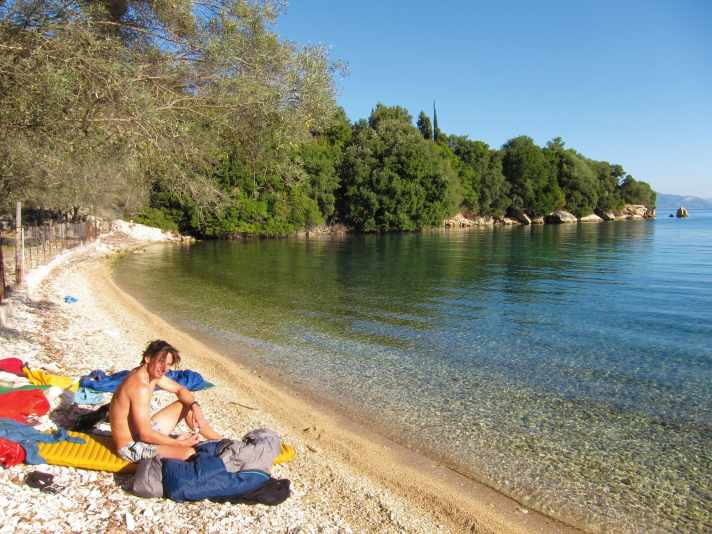
There's something meditative about paddling. Especially when you paddle for hours on end. For me, it's a bit like paragliding: take-off and landing are fun, but in between it can get boring. Even with the wind at your back, the 12'6 inflatables don't glide: If you want to ride wind waves, you have to paddle until your veins burst. Sooo exhausting. Too exhausting! We let the windswell roll under us; on the east side of Lefkas the waves disappear anyway. We often paddle side by side, chatting, philosophising about life, fooling around. Then we each find our own course, our own pace, think about things, or even better: think nothing, enjoy the sun on our skin and the view of the sea.
If you believe science, the sea acts like an antidepressant. I can feel it. The dark clouds of thoughts fizzle out, my forehead smoothes out, the latent tension that plagues me in everyday life falls away. And this despite the fact that we are now paddling with a crosswind, the worst kind of wind because it constantly pushes the bow off course.
Seven days of happiness and freedom
That's why we later enjoy the watery cappuccino at Agrios Beach. A bad-tempered barman in a camouflage jacket shoves the cups under our noses and then locks the toilets. The low season doesn't just have its advantages. At the next table, Christian and Imke from Bonn sip their nasty cappuccino, grimace and look over to us to show their solidarity. Christian and Imke are sea kayakers and are also knocked out by the wind. When it dies down and we move on, Christian is determined to show us that he is somehow a SUPer after all. He pushes himself out of the seat of his kayak. It sways and wobbles. He stands there, knees trembling, grabs the double paddle by the blade and tries to paddle. We applaud, but can't help laughing. Great, Christian!
The final stage leads through the eye of the needle. In the north-east, the sea narrows to form a channel back to Lefkada. Many charter sailors are also heading home. We join their convoy and our hearts are heavy.
The circumnavigation of the island is over.
- Do not shower for 7 days,
- 7 days of not knowing where you'll end up,
- Sleep outside for 7 days,
- Decide spontaneously for 7 days.
Marvellous! But it's over!
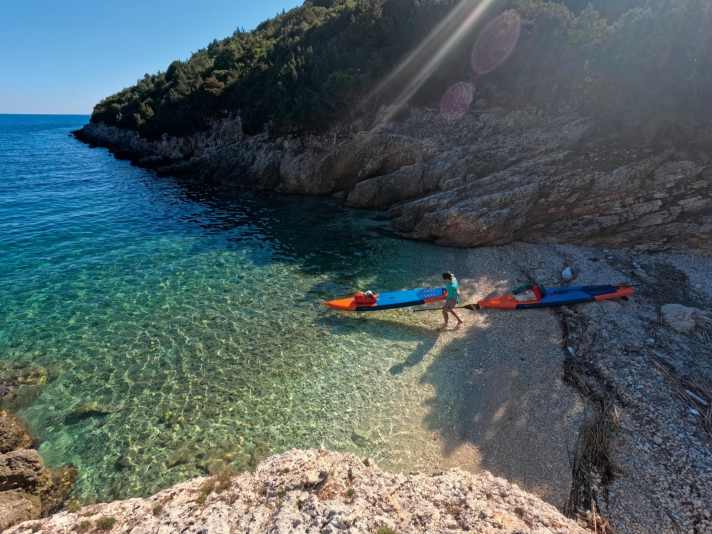
On our last evening, lucky angel Maria hands us the keys to a sailing yacht. Instead of hanging around the airport, we sit in the cockpit of a Jeanneau 34, uncorking red wine and gazing at the starry sky. While I ponder our trip, Laurin is already making plans.
Laurin: "How about Formentera next? Or the Aeolian Islands? Zakynthos would be cool. What do you think?" Me: "Great, I'm in!"
